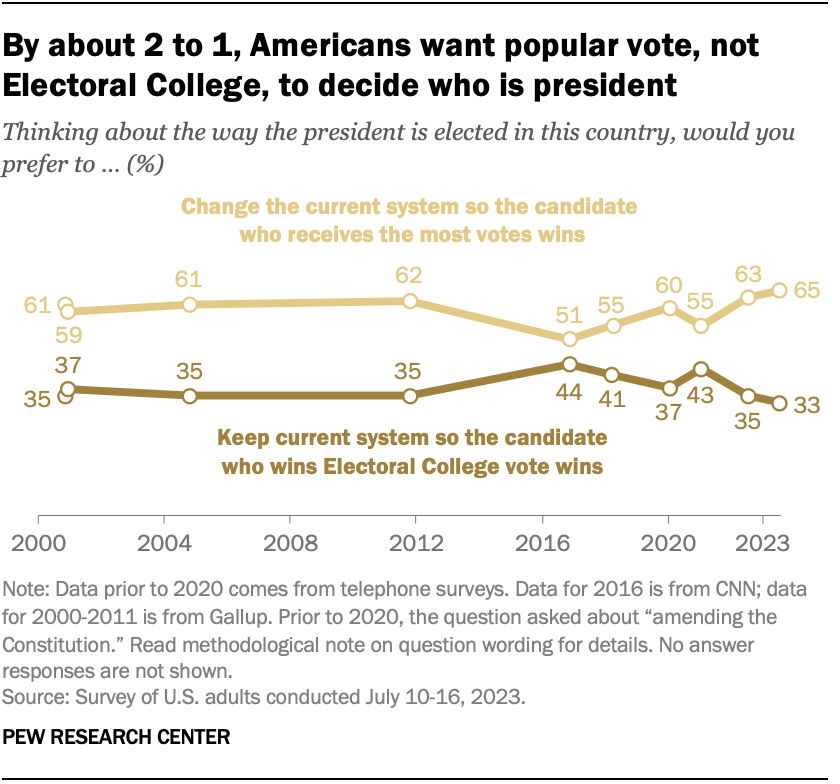Republicans are evenly divided.
https://www.pewresearch.org/short-reads/2023/09/25/majority-of-americans-continue-to-favor-moving-away-from-electoral-college/

Moderator: Community Team

























Positive views of many governmental and political institutions are at historic lows. Just 16% of the public say they trust the federal government always or most of the time. While trust has hovered near historic lows for the better part of the last 20 years, today it stands among the lowest levels dating back nearly seven decades. And more Americans have an unfavorable than favorable opinion of the Supreme Court – the first time that has occurred in polling going back to the late 1980s.
A growing share of the public dislikes both political parties. Nearly three-in-ten (28%) express unfavorable views of both parties, the highest share in three decades of polling. And a comparable share of adults (25%) do not feel well-represented by either party.
Candidate choices are underwhelming. As the presidential campaign heats up, 63% of Americans say they are dissatisfied with the candidates who have emerged so far. Setting aside the presidential campaign, there has been a downward trend in views of the quality of all political candidates. Just 26% rate the quality of political candidates as very or somewhat good, down about 20 percentage points since 2018.
Majorities back age and term limits and eliminating the Electoral College. Reflecting the public’s frustration with the federal government and political leaders, large shares of Americans support various changes to the political system, including for such long-standing proposals as establishing term limits for members of Congress and scrapping the Electoral College. Age limits – for both federal elected officials and members of the Supreme Court – draw broad support.

























































































Since 2000, a Republican presidential candidate has never taken more than 51 percent of the national popular vote (George W. Bush in 2004). Bush’s 2004 win was the only time in the last six presidential elections where a Republican candidate took more than 48 percent of the popular vote. Even so, Republicans have been able to win the presidency in three of those six elections.
If these patterns continue to hold, the 2024 GOP nominee taking just 48 percent of the two-party popular vote could still win a comfortable Electoral College majority. Here’s how that could happen...





























































...the Electoral College puts a magnifying glass on just a few states that could have tremendous control over presidential elections.
"The Electoral College does mean a small number of states have undue weight in the outcome of our elections and that smaller manipulations can have broad national consequences," said Wendy Weiser, vice president for democracy at New York University's Brennan Center for Justice, which advocates for expanded ballot access.
What she means by manipulations are the efforts by Republicans to change election laws in their favor.
"Vote suppression is one way of doing that — subtracting voters from the electorate who you think won't vote for your preferred candidates," she said. "But this new trend of actually taking over the machinery of elections and giving themselves the power to run things or make decisions or count the votes is another way of doing this."
Republican state lawmakers in places like Georgia and Texas have advanced bills that would give new powers to legislatures to fire election officials and overturn elections.
















































At the event in Florida, the organizers explained the virtues of their proposal (and there are many). But I was surprised that the pitch was being made by lifelong Republicans. One was “never-Trumper” Michael Steele, the former chairman of the Republican National Committee. Another was Saul Anuzis, former chairman of the Michigan Republican Party, who criticized Trump in 2016 but has softened his stance since and has repeatedly praised him. And finally, there was Patrick Rosenstiel, the chief executive of a political strategy firm who previously led field operations to help get John G. Roberts Jr. and Samuel A. Alito Jr. confirmed to the Supreme Court. This wasn’t exactly Rep. Alexandria Ocasio-Cortez’s (D-N.Y.) crowd.
I recently got back in touch with Rosenstiel after the dust settled from the 2020 election to ask him why he, a conservative Republican, favored jettisoning a system that continues to systematically advantage Republican candidates.
“I think Republicans and Republican ideas win whenever we campaign directly to voters,” Rosenstiel explains. “And I believe national popular vote will force the Republican candidate for president to campaign in all 50 states. Plain and simple, Republican ideas win, and I’m not afraid of our ideas.”
More specifically, though, Rosenstiel points to the fact that the electoral college battleground map means most of the country gets ignored. “Ninety-six percent of the 2020 presidential campaign occurred in just 12 battleground states,” he says. “President Trump won the popular vote in those battleground states in 2020 and 2016.” The same dynamic held in 2016, when 94 percent of campaign events were held in just 12 states. Two-thirds of 2016 campaign events were held in just six states. Thirty-eight states were effectively ignored by both candidates.
These startling facts refute the main objection that many Republicans usually raise to the national popular vote: that small red states will no longer matter in presidential politics. The truth, Rosenstiel argues, is that small red states (and small blue states) already don’t matter. They’re simply taken for granted by candidates in both parties. “When is the last time you’ve seen a general election campaign event in North Dakota or Montana or Vermont or Delaware?” Rosenstiel asks.
Some Republicans I’ve spoken to also argue that the electoral college causes Republican presidential candidates to pursue campaign strategies that give them a narrow path to the White House but ensure the party remains unpopular nationally. They argue it’s a losing strategy over the long term, and the GOP’s survival requires a course correction toward national popularity — not just popularity in a few crucial battleground states. In their view, the Republican Party would be healthier if GOP presidential candidates couldn’t write off big states such as California or New York and needed to once again compete for votes in cities.
























GaryDenton wrote:It's not good for democracy or a stable government when one party doesn't have to try to win the most votes in a presidential election.






















bigtoughralf wrote:The US and UK systems are the worst of both worlds. Not enough monopoly of power for a single strong party to be able to to engage in long-term work without the distraction of election cycles (e.g. China, Saudi Arabia) and not enough representation to deliver governments and decision-making that actually represent the plurality of opinion in their countries (e.g. Switzerland, Ireland, Netherlands).















GaryDenton wrote:Trump wouldn't have tried to overthrow the election he lost by many millions except the Republicans realized they needed only a handful of corrupt officials to flip some electors.






























Pack Rat wrote:bigtoughralf wrote:The US and UK systems are the worst of both worlds. Not enough monopoly of power for a single strong party to be able to to engage in long-term work without the distraction of election cycles (e.g. China, Saudi Arabia) and not enough representation to deliver governments and decision-making that actually represent the plurality of opinion in their countries (e.g. Switzerland, Ireland, Netherlands).
Obviously, you want a dictatorship form of government, like Russia, heh. Most of us would rather deal with a messy democracy and speak openly, instead of ending up falling out of a window.






























 3
3




 2
2







































































jonesthecurl wrote:Umm, so here's an idea - not just for the US, Monarchies, or Dictatorships...
Maybe one guy isn't in charge of everything.
Dukasaur wrote: That was the night I broke into St. Mike's Cathedral and shat on the Archibishop's desk































GaryDenton wrote:[b]The current goal is to have the National Popular Vote Compact in effect by 2028.

Pack Rat wrote:if it quacks like a duck and walk like a duck, it's still fascism
viewtopic.php?f=8&t=241668&start=200#p5349880




























Users browsing this forum: mookiemcgee